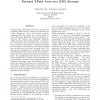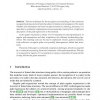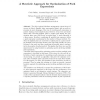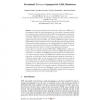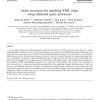137
click to vote
COMAD
2008
15 years 3 months ago
2008
Although many algorithms have been proposed for evaluating XPath queries containing un-ordered axes (child, descendant, parent and ancestor) against streaming XML data, there are ...
133
click to vote
CC
2005
Springer
15 years 4 months ago
2005
Springer
Various techniques for the navigation and matching of data structures using path expressions have been the subject of extensive investigations. No matter whether such techniques ar...
129
click to vote
DEXA
1995
Springer
15 years 5 months ago
1995
Springer
Abstract. The object-oriented database management systems store references to objects (implicit joins, precomputed joins), and use path expressions in query languages. One way of e...
106
click to vote
DBPL
1993
Springer
15 years 6 months ago
1993
Springer
Fox
Finding Objects of eXperiments
is the declarative query language for Moose
Modeling Objects Of Scienti c Experiments
, an object-oriented data model at the core of a scient...
110
click to vote
XSYM
2004
Springer
15 years 7 months ago
2004
Springer
A key step in the optimization of declarative queries over XML data is estimating the selectivity of path expressions, i.e., the number of elements reached by a specific navigatio...
133
click to vote
WIDM
2004
ACM
15 years 7 months ago
2004
ACM
We address the problem of querying XML data over a P2P network. In P2P networks, the allowed kinds of queries are usually exact-match queries over file names. We discuss the exte...
116
click to vote
ICDE
2005
IEEE
15 years 7 months ago
2005
IEEE
Various index structures have been proposed to speed up the evaluation of XML path expressions. However, existing XML path indices suffer from at least one of three limitations: ...
129
click to vote
CIKM
2009
Springer
15 years 8 months ago
2009
Springer
XML query languages use directional path expressions to locate data in an XML data collection. They are tightly coupled to the structure of a data collection, and can fail when ev...
126
click to vote
WWW
2006
ACM
16 years 2 months ago
2006
ACM
Path expressions are the principal means of locating data in a hierarchical model. But path expressions are brittle because they often depend on the structure of data and break if...
